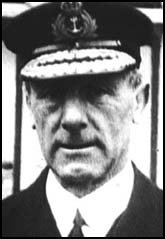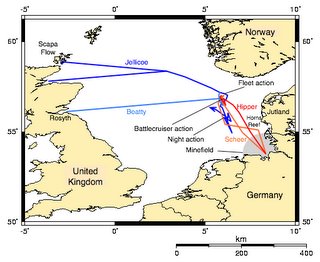
This is coolbert: Prior to the outbreak of World War One, the naval buildup of dreadnought [battleships] ships had reached a crescendo. The navies of Britain and Germany, in case of war, were prepared to do battle against one another on a monumental scale. It was felt that a climactic naval battle would occur and the outcome of this naval battle would determine the victor in the conflict.
In the months after the outbreak of World War One, both navies, of Britain and Germany made ready for this climactic sea battle. And yet, NOTHING HAPPENED! There were what could be called skirmishes at sea, but no major sea battle as had been envisioned prior to the war involving large fleet activities. And this went on for two years! It seems that both sides realized that they had spent, prior to the start of the war, so much time, energy, money, etc., building their grand fleets [the British called their fleet the "Grand Fleet", the Germans called theirs the "High Seas Fleet"], that they were hesitant to commit them [the fleets] to one huge, climactic battle, the decision of which would decide the victor and loser in the general war!
Having made ready and carefully made plans [the Germans hoped to lead the British fleet into a trap and the British hope to lead the German fleet into a trap], and after waiting for two years for SOMETHING to happen, the climactic battle did occur. A sea battle that became known as Jutland for the British and Helgoland for the Germans.
The German High Seas Fleet sortied into the North Sea on 31 May 1916 , according to their plan, hoping to provoke the British. The British, detecting the movement, then sortied forth from their bases in response, according to their plan. The sea battle was ON! At first things went very well for the Germans, the German fleet inflicting heavy damage upon the British. However, later in the day, heavy dreadnought reinforcements of the British Grand Fleet in turn took a heavy toll of German ships, both sides maneuvering accordingly to gain advantage. With the arrival of these heavy British dreadnought, the German commander realized he was in real peril, and decided to call off the fight and return to base, maneuvering his remaining ships quickly to do so.
It was at this point that what is called the "fog of war" set in for the British side. The "fog of war" is that term used to describe the uncertain conditions apparent to the combat commander. Uncertain and imprecise conditions that do not allow the combat commander to make sound, logical, rational, and correct decisions. Rather than being certain of what he knows, the commander is more certain of what he does not know! This uncertainty is primarily due to the chaotic conditions existing on the battlefield and imprecise reporting from subordinates. The overall impact is to create indecision in the mind of the combat commander.
Jellicoe, the commander of the Grand Fleet, was confronted by the fog of war. Both literally and figuratively so! Receding daylight, fog, haze, smoke, uncertainty as to the exact whereabouts of his ships and the German ships, all contributed to the "fog of war". At the high point of the sea battle, a fork in the road was reached, so to speak. Based upon the imprecise information available to him, Jellicoe had to make a decision as to how to further pursue the battle. One fork would lead to the climactic victory the British hoped for, but also carried the possibility of catastrophic losses. The other fork was the conservative fork, continue the march as it had been going, not risking catastrophic further losses, but not gaining the climactic victory. Jellicoe had to make this decision, given the inexact information he had and had THIRTY SECONDS to make this decision. Jellicoe's decision was the conservative fork, and that was the route the Grand Fleet went down. The results were the German fleet escaping, the naval Battle of Jutland resulting in what most experts conclude was a draw, and the Great War continuing for more than two years. For this decision, Jellicoe was roundly criticized and declared to be TIMID!!

In the 1920's, the British Admiralty held a map exercise [mapex] to critique the Battle of Jutland. Lord Mountbatten, who was still a young naval officer at the time, recounted this mapex and the surprised conclusion of the many admirals and captains present. These senior naval commanders, who had been previously almost uniformly critical of Jellicoe, upon examining the information available to Jellicoe at the time of the battle, concluded that if they had been in his [Jellicoe's] position, they would have done the same thing as did the commander of the Grand Fleet at Jutland.
Unfortunately, the reputation of Jellicoe was not redeemed, his career ending in controversy. A terrible shame.
To read more about Jutland, click here.
coolbert.

0 Comments:
Post a Comment
Subscribe to Post Comments [Atom]
<< Home